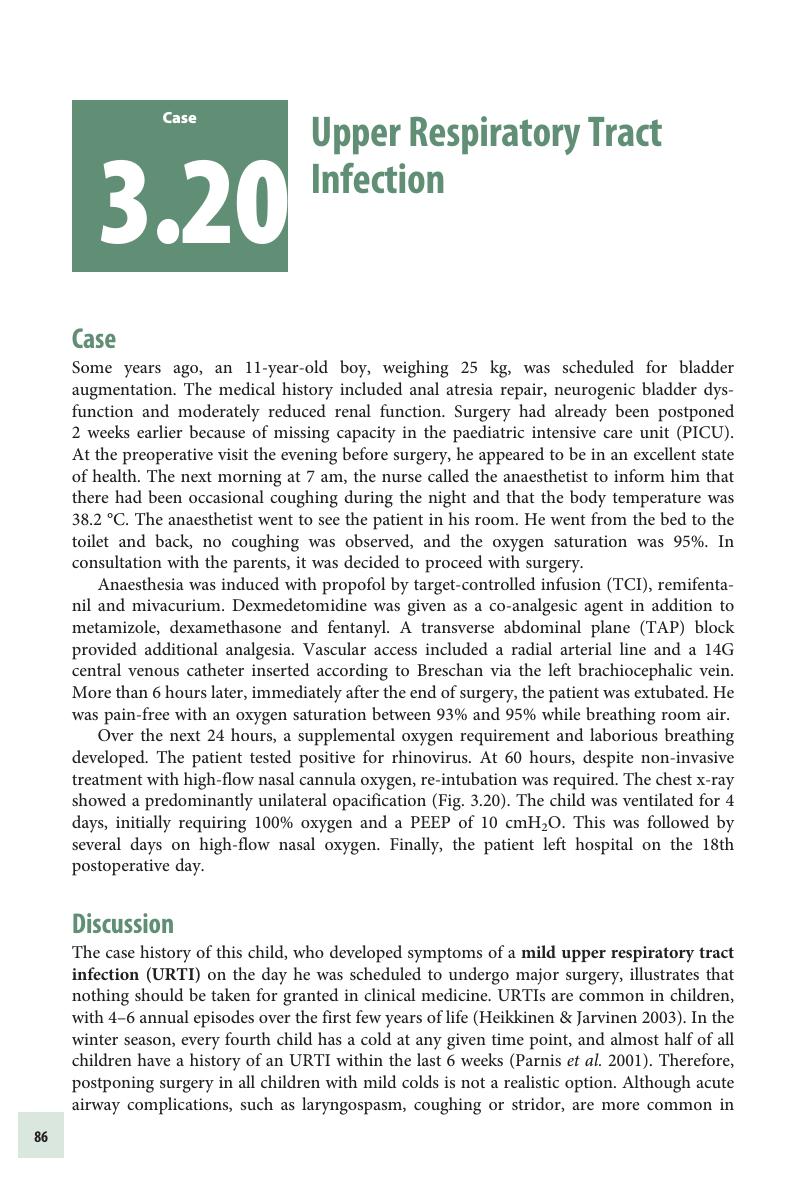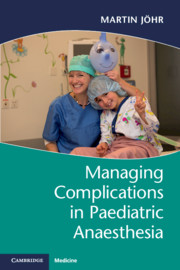Book contents
- Managing Complications in Paediatric Anaesthesia
- Managing Complications in Paediatric Anaesthesia
- Copyright page
- Dedication
- Contents
- Acknowledgements
- Abbreviations
- 1 Introduction
- 2 Concepts and Strategy
- 3 Airway-Related Problems
- Case 3.1 Breathing System
- Case 3.2 Cannot Intubate, Cannot Ventilate
- Case 3.3 Can Intubate, Cannot Ventilate
- Case 3.4 Laryngospasm
- Case 3.5 Inappropriately Sized Endotracheal Tube
- Case 3.6 Insertion Depth of the Endotracheal Tube
- Case 3.7 Laryngeal Perforation
- Case 3.8 Bronchial Rupture
- Case 3.9 Damage to Teeth
- Case 3.10 Damage Related to a Supraglottic Airway
- Case 3.11 Regurgitation during the Use of a Supraglottic Airway
- Case 3.12 Pneumothorax
- Case 3.13 Post-Obstructive Pulmonary Oedema
- Case 3.14 Pulmonary Aspiration
- Case 3.15 Bronchial Foreign Body
- Case 3.16 Pharyngeal Foreign Body
- Case 3.17 Oesophageal Foreign Body
- Case 3.18 Unanticipated Tracheal Stenosis
- Case 3.19 Unknown Pre-existing Pathology
- Case 3.20 Upper Respiratory Tract Infection
- 4 Vascular Access
- 5 Regional Anaesthesia
- 6 Medication-Related Problems
- 7 Pre-existing Conditions
- 8 Miscellaneous
- Index
- References
Case 3.20 - Upper Respiratory Tract Infection
from 3 - Airway-Related Problems
Published online by Cambridge University Press: 09 July 2018
- Managing Complications in Paediatric Anaesthesia
- Managing Complications in Paediatric Anaesthesia
- Copyright page
- Dedication
- Contents
- Acknowledgements
- Abbreviations
- 1 Introduction
- 2 Concepts and Strategy
- 3 Airway-Related Problems
- Case 3.1 Breathing System
- Case 3.2 Cannot Intubate, Cannot Ventilate
- Case 3.3 Can Intubate, Cannot Ventilate
- Case 3.4 Laryngospasm
- Case 3.5 Inappropriately Sized Endotracheal Tube
- Case 3.6 Insertion Depth of the Endotracheal Tube
- Case 3.7 Laryngeal Perforation
- Case 3.8 Bronchial Rupture
- Case 3.9 Damage to Teeth
- Case 3.10 Damage Related to a Supraglottic Airway
- Case 3.11 Regurgitation during the Use of a Supraglottic Airway
- Case 3.12 Pneumothorax
- Case 3.13 Post-Obstructive Pulmonary Oedema
- Case 3.14 Pulmonary Aspiration
- Case 3.15 Bronchial Foreign Body
- Case 3.16 Pharyngeal Foreign Body
- Case 3.17 Oesophageal Foreign Body
- Case 3.18 Unanticipated Tracheal Stenosis
- Case 3.19 Unknown Pre-existing Pathology
- Case 3.20 Upper Respiratory Tract Infection
- 4 Vascular Access
- 5 Regional Anaesthesia
- 6 Medication-Related Problems
- 7 Pre-existing Conditions
- 8 Miscellaneous
- Index
- References
Summary

- Type
- Chapter
- Information
- Managing Complications in Paediatric Anaesthesia , pp. 86 - 88Publisher: Cambridge University PressPrint publication year: 2018



